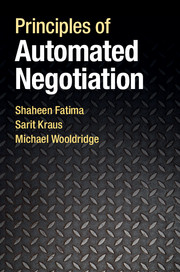Book contents
- Frontmatter
- Dedication
- Contents
- List of illustrations
- Preface
- Acknowledgements
- Summary of key notation
- 1 Introduction
- 2 Games in normal form
- 3 Games in extensive form
- 4 Negotiation domains
- 5 Strategic analysis of single-issue negotiation
- 6 Strategic analysis of multi-issue negotiation
- 7 The negotiation agenda
- 8 Multilateral negotiations
- 9 Heuristic approaches
- 10 Man–machine negotiations
- 11 Axiomatic analysis of negotiation
- 12 Applications
- 13 Related topics
- 14 Concluding remarks
- Appendix A Proofs
- References
- Index
9 - Heuristic approaches
Published online by Cambridge University Press: 05 November 2014
- Frontmatter
- Dedication
- Contents
- List of illustrations
- Preface
- Acknowledgements
- Summary of key notation
- 1 Introduction
- 2 Games in normal form
- 3 Games in extensive form
- 4 Negotiation domains
- 5 Strategic analysis of single-issue negotiation
- 6 Strategic analysis of multi-issue negotiation
- 7 The negotiation agenda
- 8 Multilateral negotiations
- 9 Heuristic approaches
- 10 Man–machine negotiations
- 11 Axiomatic analysis of negotiation
- 12 Applications
- 13 Related topics
- 14 Concluding remarks
- Appendix A Proofs
- References
- Index
Summary
In the previous chapters, we saw that finding optimal offers can be computationally expensive, especially in the context of solving the trade-off problem for the PDP and for finding optimal agendas. Because software agents have limited computational resources at their disposal, heuristic approaches can be useful for the design of negotiating agents in such situations. In such approaches, a heuristic is used to generate counter offers that are “good enough” (i.e., close to optimum) but not necessarily optimal.
Dealing with the bounded rationality of agents is just one of the reasons for using a heuristic approach. Another reason is that an opponent might not always play equilibrium strategies. In such cases, a strategy that is a best reply to the opponent's strategy must be played rather than an equilibrium one.
Irrespective of the reason for using this approach, heuristics can be designed for a number of purposes. For example, they can be designed to generate optimal counter offers, to predict information about an opponent, or to find optimal agendas. Research into the design of heuristics has been growing continuously and several different approaches – including local search methods, approximation methods, and machine learning methods – have been adopted. Below, we introduce a number of representative works in terms of their key underlying ideas, goals, and main results.
Information
- Type
- Chapter
- Information
- Principles of Automated Negotiation , pp. 157 - 175Publisher: Cambridge University PressPrint publication year: 2014
